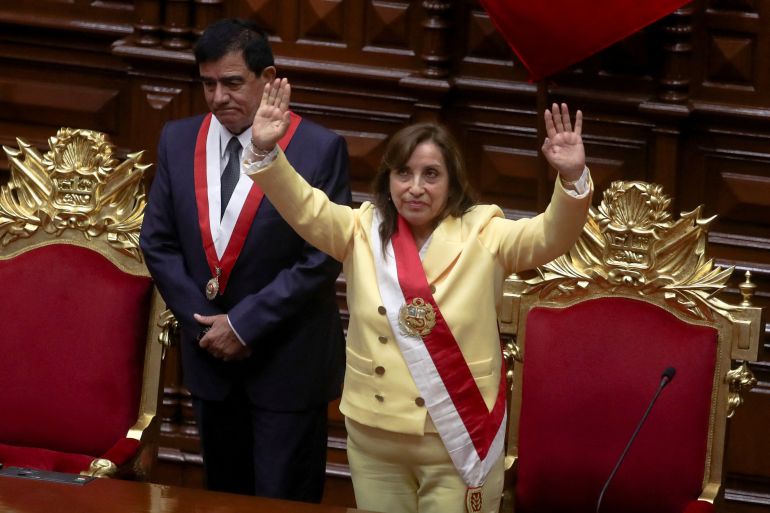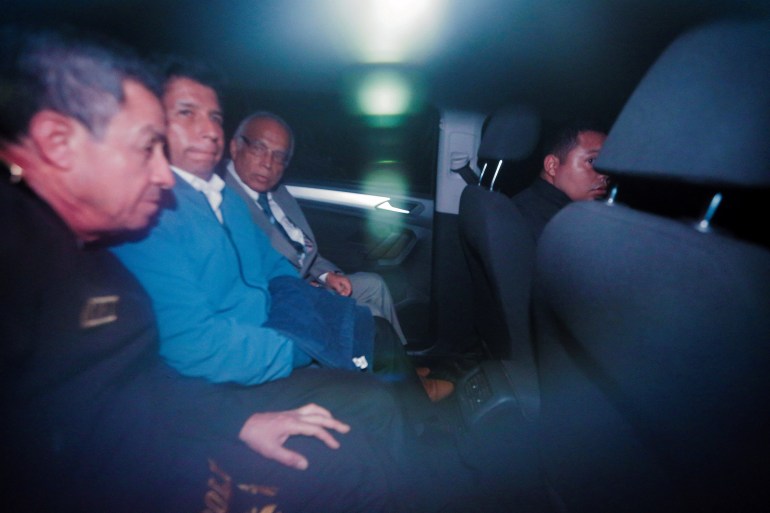Peru’s Congress swears in new president after Castillo removed
Dina Boluarte becomes first female president after a tumultuous day that saw Pedro Castillo arrested and accused of ‘rebellion’ and ‘conspiracy’.

Dina Boluarte has been sworn in as Peru’s new president after left-wing leader Pedro Castillo was removed in an impeachment trial and arrested following his attempt to illegally shut down Congress.
The opposition-led legislature on Wednesday afternoon overwhelmingly voted in favour of removing Castillo, who earlier in the day had announced plans to “temporarily” dissolve the legislature and rule by decree.
Keep reading
list of 3 itemsOAS holds meeting after Peru’s embattled president alleges ‘coup’
Photos: Lagoon dries up as Peru’s southern Andes faces drought
Castillo had said the move aimed to “reestablish the rule of law and democracy” in Peru but it was widely condemned by opposition leaders and others, including Boluarte, his vice president, as an attempted “coup”.
Congress asked 60-year-old Boluarte to take over following its impeachment vote, making her the first woman to lead the South American nation. She was sworn in as president until 2026.
Boluarte called for a political truce to overcome the crisis and said a new cabinet inclusive of all political stripes would be formed. “There has been an attempted coup … that has not found an echo in the institutions, nor in the street,” she said after her swearing-in.
“What I ask for is space, time to rescue the country,” she added.
The public ministry said on Wednesday evening that Castillo had been arrested and accused of the crimes of “rebellion” and “conspiracy” for breaking the constitutional order.
Television outlets showed the former president leaving a police station and reported he would be moved to a police-run prison.
Third impeachment attempt
In central Lima, riot police blocked access to the presidential and congressional palaces as thousands of protesters – some for and some against Castillo’s removal – descended on the city in a mood of jubilance and rage.
Flanked by a wall of heavily-armed police, hundreds of Castillo supporters chanted their full-throated backing for the ex-president’s attempt to dissolve Congress.
“I came here because I’m tired of this corrupt Congress that has blocked all of [Castillo’s] initiatives. I’m a humble woman from the countryside. I don’t have electricity or running water. A year and a half, and this Congress has done nothing for the people,” said Milagros Rivera Mesías, 56, a homemaker from Lima.
Across the street, an elated crowd of anti-Castillo protesters were dancing to a clamorous marching band.
“Castillo is corrupt. He steals money and gifts it to his family, while we suffer. I’m out here selling chocolates to feed my three kids and care for my sick father,” Rosana Palomino, 30, told Al Jazeera.
A curfew was due to come into force at 10pm (03:00 GMT) but was later lifted.

Peru has endured years of political turmoil, with multiple leaders accused of corruption, frequent impeachment attempts and presidential terms cut short.
The latest legal battle began in October when the prosecutor’s office filed a constitutional complaint against Castillo for allegedly leading “a criminal organisation” to profit from state contracts and for obstructing investigations.
Congress summoned Castillo last week to respond to accusations of “moral incapacity” to govern.
The left-wing former teacher and union leader had called the allegations “slander” by groups seeking “to take advantage and seize the power that the people took from them at the polls”.
Castillo had survived two previous impeachment attempts since taking office in July 2021 following a hard-fought election victory.
In a televised statement on Wednesday, Castillo had announced a “government of exception”, allowing him to use emergency powers to call for new elections.
The president of Peru’s constitutional court condemned the move as a “coup d’etat” and members of the right-wing opposition appealed to armed forces to “restore constitutional order”. Foreign Minister Cesar Landa also resigned in protest, accusing Castillo of “violating the constitution”.
The United States echoed that criticism, with Ambassador to Peru Lisa Kenna urging Castillo to “reverse his attempt to shut down Congress and allow Peru’s democratic institutions to function according to the Constitution”.
“We encourage the Peruvian public to remain calm during this uncertain time,” she wrote on Twitter.

‘Haphazard self-coup’
The presidential power to dissolve Peru’s Congress is controversial and rarely exercised.
In 2019, then-President Martin Vizcarra dissolved Congress, leading to his own suspension. He was later impeached.
In 1992, Alberto Fujimori – a polarising figure imprisoned for human rights violations – likewise used his presidential powers to dissolve the legislature and suspend the country’s constitution.
Castillo, originally from the rural town of San Luis de Puna in northwestern Peru, had faced allegations of corruption and wrongdoing from the start of his presidency. He also faced accusations of incompetency after he appointed five cabinets and an estimated 80 ministers in just over a year and a half as president.
A lack of planning was a “constant” in Castillo’s short presidency, Will Freeman, an analyst on Latin American politics and PhD candidate at Princeton University in the US, told Al Jazeera on Wednesday.
“Virtually everything was improvised, from his botched COVID recovery response to his sparring with congressional opposition, which made it its mission to oust Castillo practically from day one,” Freeman said in an email.
Castillo’s presidency also ended with an improvised move, Freeman added. “His haphazard self-coup attempt received virtually no support beyond the walls of the presidential palace,” he said.
“It ended up looking like a reckless attempt to avoid being ousted by Congress and facing corruption charges, but it only ended up speeding up those outcomes.”
Noam Lupu, an associate professor of political science and associate director of the Latin American Public Opinion Project at Vanderbilt University, stressed that Peruvians were “fed up with the political status quo”.
“Peru leads the region in the public perception that corruption is widespread among politicians,” Lupu told Al Jazeera in an email, adding that Castillo’s departure “will not calm” widespread frustrations.
“The question now is who will be the next target of this deep public distrust and dissatisfaction.”
With reporting by Neil Giardino in Lima